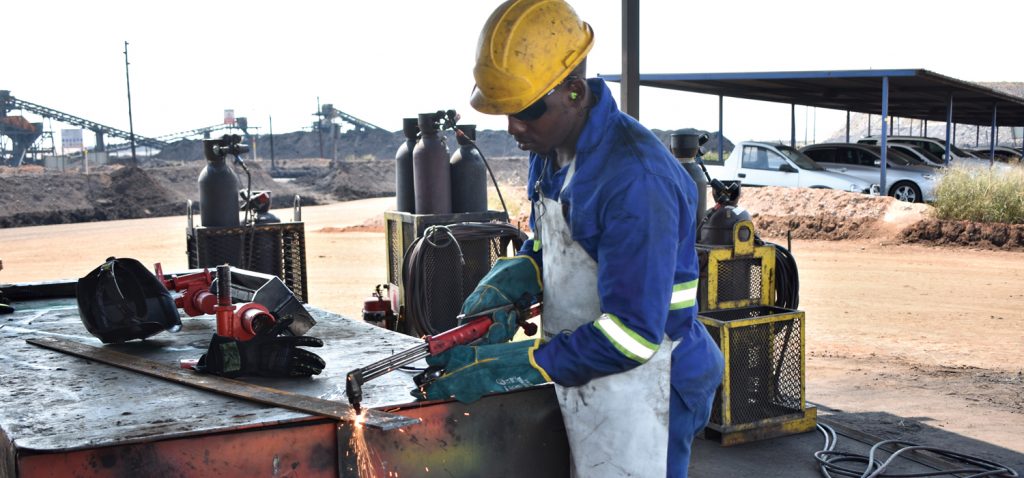SA Mining
Skills Development
Numerous challenges are impeding the development of skills needed for South African miners to compete with their counterparts in major mining jurisdictions, such as North and South America and Australia. These include a history of sub-standard education and socio-economic inequalities, which have all left many lacking the necessary skills to succeed in the workplace.
It is imperative that mining companies, whether junior or major, assess South Africa’s skills needs for the country’s mining sector to succeed. A highly skilled workforce will be essential as mines become more mechanised and automated. Digitalisation of the mining sector will have an immense effect on the operations. If companies and their employees fail to adapt to the new digital realities, they will struggle to remain competitive.
Major mining nations are all investing heavily in skills development to ensure their workforces have the skills required for Mining Industry 4.0. The skills needed going forward are changing rapidly, from self-driving trucks to autonomous continuous miners. Mining companies need to assist graduates and current employees by offering them the skills they need to match the ever-changing needs in order to maintain the industry’s competitiveness.
South Africa unfortunately lags far behind in skills development programmes and initiatives to effectively upskill and reskill those currently working in and those who will soon be entering the mining industry.
Labour-intensive
According to the Minerals Council South Africa, the mining sector employs in excess of 460 000 people, provides over R143.5-billion in employee earnings and contributes around 7% to GDP, which demonstrates the sector’s importance as an engine for employment and revenue generation in the country. The large number of employees is also indicative of how labour-intensive the industry is.
Having large numbers of people on-site, particularly working underground, brings with it significantly increased health and safety risks and high labour costs. South Africa has some of the deepest deep-level mines, with ageing infrastructure and depleting resources. The costs of mining are driving miners to consider more cost-efficient methods. The need to use modern technologies to improve efficiencies, reduce risks and extend life of mines has never been greater.
Skills shortages
The mechanisation of mining is resulting in greater technical knowledge to build, maintain and repair mining machinery and equipment. The depletion of resources means precision mining skills will also become key to success. Yet there is a shortage of well-trained and experienced artisans to service the growing number of trackless mining machinery (TMM) that is found on modern mines.
Moreover, existing TMM operators continuously need to be trained and kept abreast of new trends and the latest technological innovations that are being applied to these new advanced technologies in order to correctly operate their machines and limit downtime. Mechanised training programmes provide artisans with specific skills in mechanised engineering that are not part of the traditional training syllabus.
Sadly, many graduates remain unemployed after completing their studies, even though they attended respected accredited training centres. This is because in many instances the curriculum did not match the needs of prospective employers, because it did not include training on the latest technologies being used in the mining industry.
Overhaul and updating of training programmes are needed as a matter of urgency to address this situation. Modern training needs to include blended training methodologies including e-learning, virtual reality, simulation and workshop practical hands-on training to allow trainees to receive comprehensive modern training that is relevant to a sector that is increasingly tech-savvy.
Impact of COVID-19 on training
The lockdown caused a significant disruption in all educational activities across South Africa, and mining artisan and engineering training was no exception. Training providers postponed and in some instances cancelled training programmes altogether. However, there were many institutions that were able to seamlessly transition their education and training programmes online.
Canyon Coal took the decision to freeze its internal training programme for the remainder of this year, but we continue providing full support on learnerships, bursaries and graduate in-training programmes.
Committed to upskilling and empowerment
Canyon Coal strives to upskill local community members and increase their opportunities of securing a job within the mining sector. To this end, we offer a range of training programmes, such as articulated dump truck (ADT), diesel bowser and excavator training, as well as vacation work to our bursary holders.
For example, to address the mining skills shortage in the Bronkhorstspruit area where Canyon Coal’s Khanye Colliery is located, the company embarked on an upskilling programme for locals. Twenty community members attended a 30-day mobile machinery for surface mining training programme between November and December 2019 at Khanye Colliery.
The trainees were given theoretical and practical training on how to safely and correctly operate machinery such as ADTs which are crucial to the transportation of coal in the mining pit and at the siding. The trainees also received hazchem firefighting and first aid training, which adds to their overall skills sets and employability.
Furthermore, we have success stories of individuals who have started off as bursary students and now are heads of department in the company. For instance, at just 29 years old, Nthabiseng Ocia Mueti was appointed as social and labour plan (SLP) manager on 1 October 2020.
She is responsible for implementing existing and developing new SLPs and local economic development projects. Mueti is a Canyon Coal bursary alumnus, who has been with Canyon Coal since 2017, having worked both on-site and at head office in various positions. She previously worked at Singani, Khanye, Ukufisa and Phalanndwa collieries as an environmental and SLP officer, and later was appointed as a compliance officer at head office. Before being appointed to her current position, Mueti served as a junior project manager in the Canyon Coal project team.






 Sign-up and receive the Business Media MAGS newsletter OR SA Mining newsletter straight to your inbox.
Sign-up and receive the Business Media MAGS newsletter OR SA Mining newsletter straight to your inbox.